For some people, the effects of high school cliques last a lifetime. You know the 'jock' in your town; still clinging to his missed opportunity to go pro, he spends his days loathing his job and his family and spends his nights lamenting what could have been. Of course his wife is the 'cheerleader', spending most of her free time maintaining her popularity with the local men. But what happens to the nerds? Often seen as the outcasts, the misfits, many nerds eventually work themselves to the very top of our society. They are business owners, lawyers, politicians, engineers, inventors, webmasters, journalists; in short, they put themselves into positions of influence in the world.
At the core of a nerd is a voracious desire to learn. Nerds generally enjoy reading. Nerds enjoy most activities that involve learning something new. Nerds do well in school because the system relies on the students' desire to learn about everything, and nerds love learning. Why is this important? Because as the old saying goes, knowledge is power.
As a generally learned group of individuals, nerds tend to be very rational people. They will always debate on principles of logic, and often see emotion as a hinderance to rational behavior. Nerds also tend to have a very cynical view of the world, because nerds are still in the minority. It is pointless to debate politics with your irrational neighbor, who supports a candidate based solely on his stance on abortion for example, when the real intellectual debate needs to deal with where exactly our government lies on the vertical scale between anarchy and totalitarianism. Therefore, nerds being the minority, tend to withdraw from public debate and politics in general. Sure, some are able to shed the cynicism and join the debate, but many do not.
But something is happening in the world today. Nerds are shedding their cynicism in droves and embracing irrational thought as a means of effecting change. It is completely irrational to believe that my $250 made a difference to Ron Paul's campaign, when he raised more than $4 million on November 5th. Yet, irrational as it was, I did it again on November 30th. This contribution was even less rational. Not only was my donation a meager 0.05% of his total that day, his total sum was relatively meager and gained little, if any, attention. Yet, undeterred by my completely irrational behavior I donated another $500 on December 16th. Why do we even bother? Because we have to try. Trying is the only cure for cynicism. It is rather easy to sit back and be cynical towards the world when you've never attempted yourself to change it.
Luckily for the Ron Paul campaign, and for America, nerds are a great group of people to have at the helm. They have intelligence, free time, 'computer skills' (is that even nerdy anymore?), and money in the bank from years of frugal spending. You know all those people buying houses they can't afford and driving SUVs they can't afford and burning up tons of expensive gas? They are not nerds. Nerds know how to live within their means, and now Ron Paul is our hero and benefactor.
I think the 'fringe' of America truly started this revolution, but the nerds are taking it to a whole new level. It took the completely irrational actions of a few dedicated Americans to shake the sturdy foundation of nerd society. Now that they have, we cannot be stopped.
Tuesday, January 1, 2008
Saturday, December 8, 2007
Gold in the Mattress or Dollars in the 401(k)?
As a Ron Paul supporter, I want to understand why Ron Paul advocates so strongly for the Gold standard. At first glance, it seems rather silly. Why is any single item better than another to be used as currency? If I were to choose a currency for a new nation today, gold seems unlikely. It has no intrinsic value. It seems its only real value stems from its "shininess". If the financial world collapses, we could not eat our gold or build houses from it. It serves no useful purpose.
Perhaps we shouldn't think too hard about this question however. Thousands of civilizations have existed for tens of thousands of years. They have existed in all corners of the Earth. They have spoken many languages and held many beliefs. But most, if not all, of these civilizations have arrived at one currency: Gold. Perhaps a more accurate description would be precious metals, with Gold and Silver being the most popular.
Precious metals make sense for a number of reasons. They are a finite resource and cannot be created by any person. They are easily worked into many different forms. Their relative scarcity assigns them a high value density, meaning they are very portable as a currency.
But as I pondered this issue I was bothered by something. If Gold is a finite resource, doesn't that imply that people will continually grow poorer as the population increases? If there are more people, there is less Gold to go around. It took me some time to get past this. Eventually it hit me; currency is not a means of wealth. Currency is a means of transaction. This epiphany suddenly put the puzzle together for me.
Imagine a small economy many years ago, perhaps a village of 10 farmers. Each farmer works all day to grow enough food for himself. There is no transaction, no need for currency. Now lets assume the population explodes to 20 farmers. Again, each works all day to grow his own food. The total economy has grown, but the economic output per person is the same. In addition, the production and consumption are equal, meaning there is no trading, exporting, importing, saving, or growth. The economy is at steady-state and could remain stable forever.
At some point, one of the farmers decides that there must be an easier way to farm. He spends his free time building a plow, attaches it to his horse, and suddenly he can produce twice as much as everyone else. He builds nine more plows and gives them to the other farmers in exchange for other goods. Now 10 farmers can feed the village of 20, thus freeing up the time of the other 10 villagers. They find new means to be productive, perhaps hunting, fishing, or building homes. This illustrates a fundamental point in economics: the only way an economy can grow is through technological advances.
Thinking further about the impact of technology we realize that as technology advances, the price of goods decrease. After the farmer invented his plow, the price of his crops eventually decrease. This is because the only "real" value in this world is the value of our time and efforts. If new technology allows us to produce more with less efforts, then prices fall. So, as the economy grows through technology, less of our currency will be used to trade basic goods, leaving more currency for new population growth, lifestyle improvements, or to be invested in yet newer technologies.
Wealth is not measured by currency; wealth is measured by lifestyle. Currency is a means of achieving wealth through lifestyle improvements, but currency is also used to purchase basic goods and invest in new technologies. If the population grows, more currency is diverted into basic goods. Therefore, what the economy really represents is a delicate, permanent balance between population, lifestyle, and technology.
All of these fundamentals will apply to an economy, if the currency is fixed in total quantity. As I've mentioned, this is one reason Gold has been used for thousands of years. What if that weren't true? If Gold was our currency, and somebody stumbled upon a new mine, they would certainly be rich. They could use the new Gold to dramatically improve their lifestyle and even to invest in new technology and help the economy grow. But, eventually the "value" of the currency would decline as it is realized by the whole population to be less scarce than previously known.
So, the moral of this story is simple: If any single person or group of people are allowed to create currency at their own discretion, it is reasonable to assume that they themselves will profit greatly at the expense of everyone else. The Federal Reserve has been assigned the task of managing our currency for nearly 100 years now. It might surprise people to learn that the Federal Reserve is a privately held corporation, and not a government entity. So lets take a quick look at how the Fed has done managing our currency, and try to understand why Ron Paul wants to abolish them and return us to Gold.
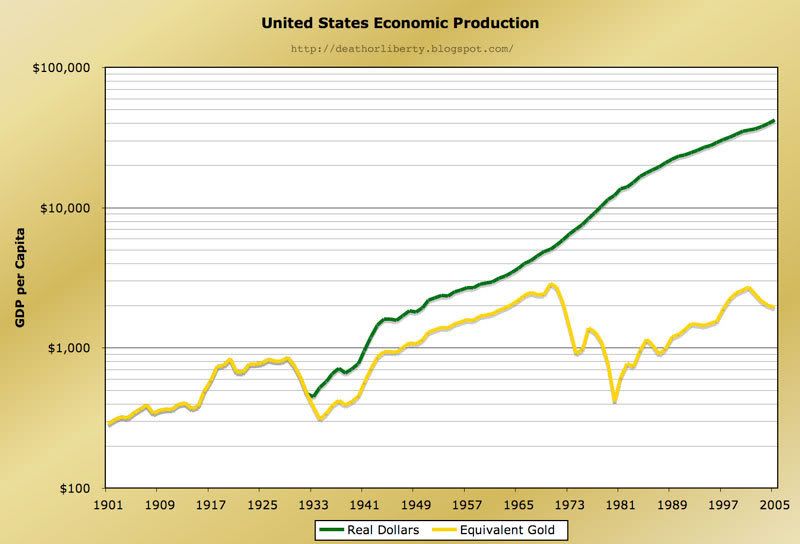
The first graph here is our economic output per person since 1901, in both Gold and US Dollars. According to this data, the average person in the US today produces approximately $40,000 per year in goods and services. This seems perfectly reasonable to me. But, seeing that the number was only about $300 in 1901, it would indicate that technology has allowed us to be 133 times more productive than we were 100 years ago. This is not likely the case.
We can see here that the US Dollar was historically linked to the value of Gold. This is why the lines overlap until 1933. But, as the government eroded the Gold standard and the Fed took full control of our currency we see that the economy in Dollars began to soar. What this really indicates is that the dollar was losing its value. If we look at the gold data, we see that a person today is roughly seven times more productive than in 1901 (from $300 to $2000). Based on technological advances in the 20th century, this seems completely plausible to me. This tells me that Gold has held its value over time, but that the dollar has declined quite dramatically.
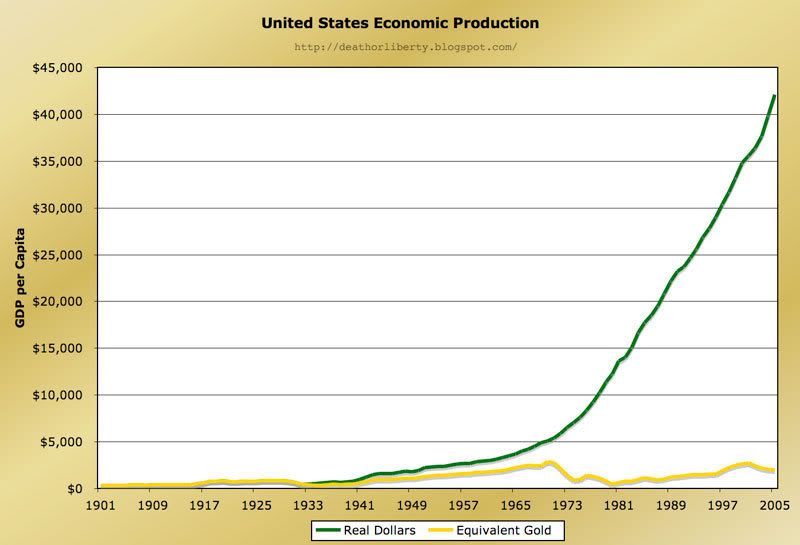
One quick point, to reiterate my last post about data presentation. The above graph is the same data presented on a linear scale. It is clear how the data is skewed in this form, and certainly adds some drama to the discussion. However, it is unfair and unnecessary.
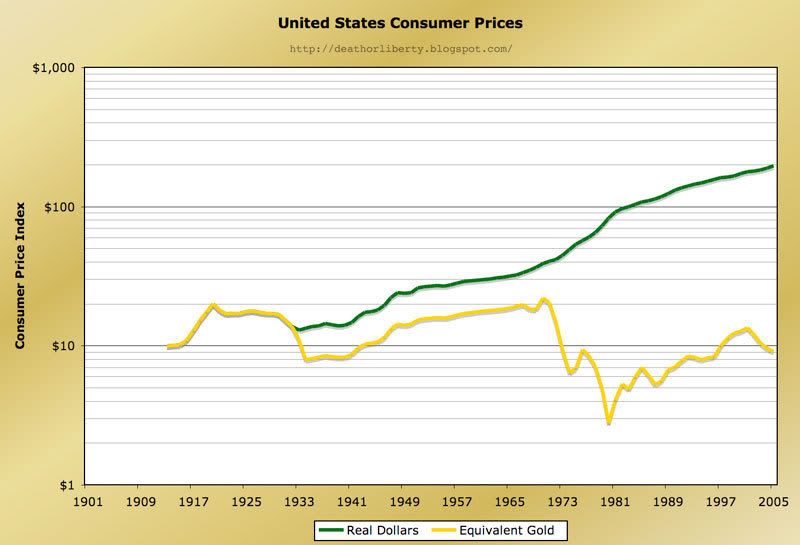
Recall my assertion that technology not only allows the economy to grow, but also reduces the prices of basic goods. As can be seen in the above graph, consumer prices have indeed fallen compared to Gold. However, prices have steadily risen when using US Dollars.
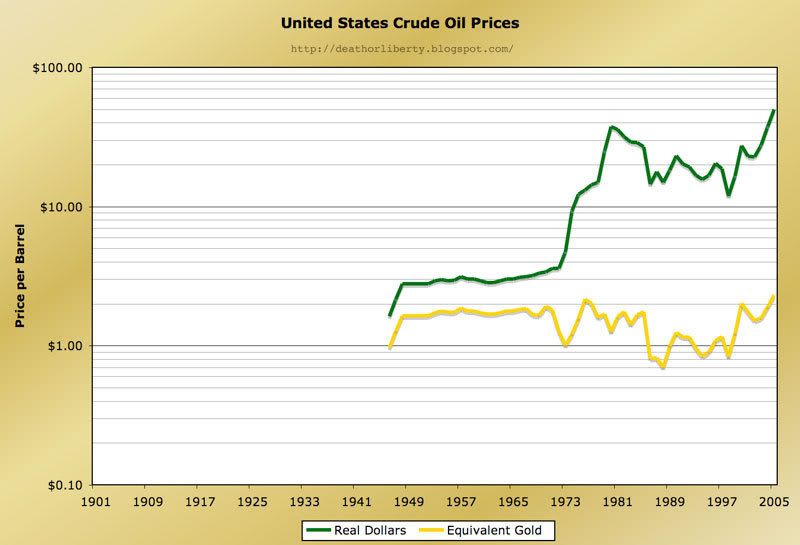
This graph shows oil prices historically. Again, the data certainly supports theories that oil prices are soaring in Dollars. But its interesting to discover that they have been relatively flat against Gold. Now, just as in consumer prices, we would expect technology improvements to lower the price of oil steadily over time. However, oil is a scarce resource and as the supply runs low the price will increase. These two effects have perhaps been canceling each other until now.
How then do we save for our future? Deflation of the currency is natural, even in gold. If technology allows you to be more productive today than yesterday, then the money you earned yesterday is not worth as much. So I wouldn't advise saving for your future by sticking Gold bars in the mattress. By investing your savings, it can be used to develop new technology and grow the economy, growing your savings along with it. But as the Fed continues to devalue our currency, I wouldn't advise saving for your future by investing in the Dollar economy either.
Perhaps the only option is to send your savings to Ron Paul and ask him to save your future. :-)
Perhaps we shouldn't think too hard about this question however. Thousands of civilizations have existed for tens of thousands of years. They have existed in all corners of the Earth. They have spoken many languages and held many beliefs. But most, if not all, of these civilizations have arrived at one currency: Gold. Perhaps a more accurate description would be precious metals, with Gold and Silver being the most popular.
Precious metals make sense for a number of reasons. They are a finite resource and cannot be created by any person. They are easily worked into many different forms. Their relative scarcity assigns them a high value density, meaning they are very portable as a currency.
But as I pondered this issue I was bothered by something. If Gold is a finite resource, doesn't that imply that people will continually grow poorer as the population increases? If there are more people, there is less Gold to go around. It took me some time to get past this. Eventually it hit me; currency is not a means of wealth. Currency is a means of transaction. This epiphany suddenly put the puzzle together for me.
Imagine a small economy many years ago, perhaps a village of 10 farmers. Each farmer works all day to grow enough food for himself. There is no transaction, no need for currency. Now lets assume the population explodes to 20 farmers. Again, each works all day to grow his own food. The total economy has grown, but the economic output per person is the same. In addition, the production and consumption are equal, meaning there is no trading, exporting, importing, saving, or growth. The economy is at steady-state and could remain stable forever.
At some point, one of the farmers decides that there must be an easier way to farm. He spends his free time building a plow, attaches it to his horse, and suddenly he can produce twice as much as everyone else. He builds nine more plows and gives them to the other farmers in exchange for other goods. Now 10 farmers can feed the village of 20, thus freeing up the time of the other 10 villagers. They find new means to be productive, perhaps hunting, fishing, or building homes. This illustrates a fundamental point in economics: the only way an economy can grow is through technological advances.
Thinking further about the impact of technology we realize that as technology advances, the price of goods decrease. After the farmer invented his plow, the price of his crops eventually decrease. This is because the only "real" value in this world is the value of our time and efforts. If new technology allows us to produce more with less efforts, then prices fall. So, as the economy grows through technology, less of our currency will be used to trade basic goods, leaving more currency for new population growth, lifestyle improvements, or to be invested in yet newer technologies.
Wealth is not measured by currency; wealth is measured by lifestyle. Currency is a means of achieving wealth through lifestyle improvements, but currency is also used to purchase basic goods and invest in new technologies. If the population grows, more currency is diverted into basic goods. Therefore, what the economy really represents is a delicate, permanent balance between population, lifestyle, and technology.
All of these fundamentals will apply to an economy, if the currency is fixed in total quantity. As I've mentioned, this is one reason Gold has been used for thousands of years. What if that weren't true? If Gold was our currency, and somebody stumbled upon a new mine, they would certainly be rich. They could use the new Gold to dramatically improve their lifestyle and even to invest in new technology and help the economy grow. But, eventually the "value" of the currency would decline as it is realized by the whole population to be less scarce than previously known.
So, the moral of this story is simple: If any single person or group of people are allowed to create currency at their own discretion, it is reasonable to assume that they themselves will profit greatly at the expense of everyone else. The Federal Reserve has been assigned the task of managing our currency for nearly 100 years now. It might surprise people to learn that the Federal Reserve is a privately held corporation, and not a government entity. So lets take a quick look at how the Fed has done managing our currency, and try to understand why Ron Paul wants to abolish them and return us to Gold.

The first graph here is our economic output per person since 1901, in both Gold and US Dollars. According to this data, the average person in the US today produces approximately $40,000 per year in goods and services. This seems perfectly reasonable to me. But, seeing that the number was only about $300 in 1901, it would indicate that technology has allowed us to be 133 times more productive than we were 100 years ago. This is not likely the case.
We can see here that the US Dollar was historically linked to the value of Gold. This is why the lines overlap until 1933. But, as the government eroded the Gold standard and the Fed took full control of our currency we see that the economy in Dollars began to soar. What this really indicates is that the dollar was losing its value. If we look at the gold data, we see that a person today is roughly seven times more productive than in 1901 (from $300 to $2000). Based on technological advances in the 20th century, this seems completely plausible to me. This tells me that Gold has held its value over time, but that the dollar has declined quite dramatically.

One quick point, to reiterate my last post about data presentation. The above graph is the same data presented on a linear scale. It is clear how the data is skewed in this form, and certainly adds some drama to the discussion. However, it is unfair and unnecessary.

Recall my assertion that technology not only allows the economy to grow, but also reduces the prices of basic goods. As can be seen in the above graph, consumer prices have indeed fallen compared to Gold. However, prices have steadily risen when using US Dollars.

This graph shows oil prices historically. Again, the data certainly supports theories that oil prices are soaring in Dollars. But its interesting to discover that they have been relatively flat against Gold. Now, just as in consumer prices, we would expect technology improvements to lower the price of oil steadily over time. However, oil is a scarce resource and as the supply runs low the price will increase. These two effects have perhaps been canceling each other until now.
How then do we save for our future? Deflation of the currency is natural, even in gold. If technology allows you to be more productive today than yesterday, then the money you earned yesterday is not worth as much. So I wouldn't advise saving for your future by sticking Gold bars in the mattress. By investing your savings, it can be used to develop new technology and grow the economy, growing your savings along with it. But as the Fed continues to devalue our currency, I wouldn't advise saving for your future by investing in the Dollar economy either.
Perhaps the only option is to send your savings to Ron Paul and ask him to save your future. :-)
Labels:
currency,
dollar,
economics,
fed,
federal reserve,
gold,
government,
inflation,
ron paul
Tuesday, November 27, 2007
government spending is NOT out of control
Now, let me be clear. I am a Libertarian and I feel very strongly that government should be strictly limited. That said, I think people in general and certainly in the media tend to be alarmists when trying to make a point. I find this practice irresponsible and detrimental to productive debate. The worst incarnation of alarmism in the media is the skewing of data presentation. As an engineer, I was taught quite strictly to gather, analyze, and present data with honesty and transparency.
So I will state my thesis clearly: government spending is not out of control, it is quite simply too high.
Let me explain this further. I recently watched a presentation by John Stossel, a fellow Libertarian and true Patriot. However, during his talk he presented a historical graph of federal government spending while trying to make the point that our federal government has grown too large. I agree with him. I disagree with his methods of presenting the data.
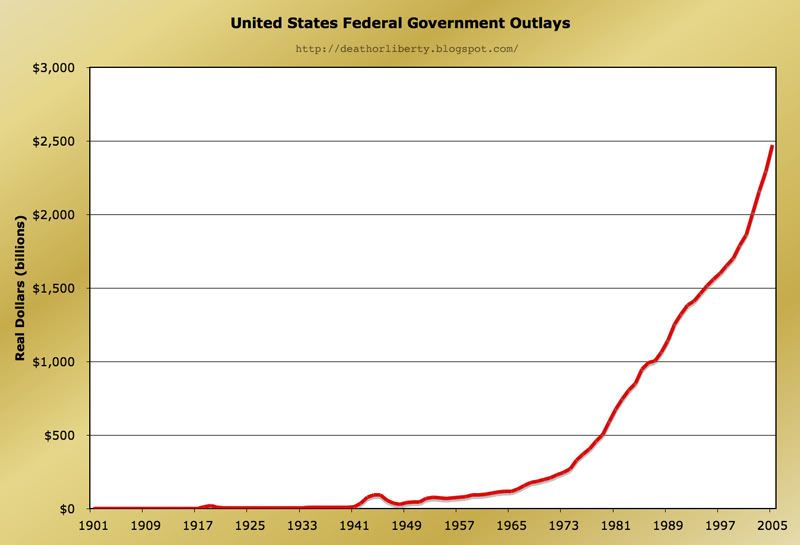
The first graph you see here is very similar to the one shown by John Stossel. It is a simple graph plotting total government spend each year. His point was that our government is out of control and increasing at an alarming rate, and the data certainly supports this. But there is one very clear giveaway that this graph is misleading, and it is something you should always look for when reviewing data. On a chart like this, the scales and limits of both axes need to be set so they are contextually relevant to the reader.
In this case, the horizontal axis is the year. This is contextually relevant; the reader can associate each year with their own lives. We can see that the chart starts in 1901 and ends in 2005, and these numbers have meaning to us.
The vertical axis here is total dollars spent; this has no relative meaning to most readers. It becomes very easy for the presenter to manipulate the visual impact of the data by changing the vertical limits, because we have no way of judging what these numbers mean to us. We can see that the graph approaches $2.5 trillion, but this gives us no indication of what that number should be, or could be. Since the number itself is meaningless to us, the data is not helping us to understand the issue at hand. This also allows misleading factors to be included in the data without notice, thus skewing the visual impact of the data even further. In this case, simply presenting total dollars spent means that population growth, inflation of the dollar, and total economic growth are all being ignored. These factors certainly affect total government spending. Additionally, the scale of the vertical axis is wrong. Because it is reasonable to expect total spending to increase over time (based on previously mentioned factors) the vertical axis should be set as logarithmic. In fact, if I had made that simple change the exaggerated curve now becomes a straight line, indicating that the growth is perfectly normal and not out of control.
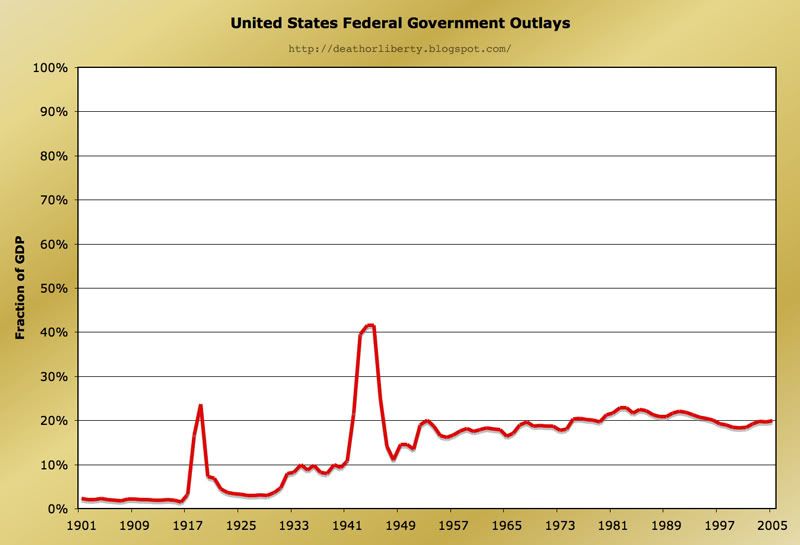
The second graph you see now is the exact same data as presented above. However, this time the total spend has been divided by the Gross Domestic Product for each year. Now, the reader is able to visualize government spending as a fraction of our total economic output. One can imagine that the upper limit of the vertical scale (100%) might represent a Totalitarian government while the lower limit (0%) might represent Anarchy. This provides contextual relevance to the vertical limits. Also, the vertical scale is now appropriate. It is reasonable to assume that changes in this graph are the result of spending policy changes and are not expected to change over time naturally. This makes the linear scale an appropriate presentation. I can imagine this revised graph now being very relevant to a political debate regarding the size and role of our federal government.
To summarize, we must always be aware of the scale and the limits of both axes when reading or presenting data. The numbers may be correct, but we need to consider both the accuracy of the numbers and the visual impact of the data when presenting honestly.
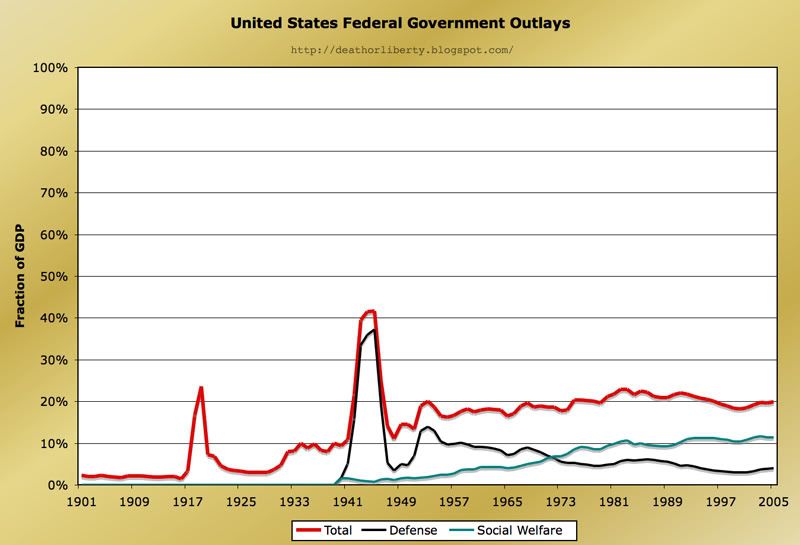
Now to take this a step beyond methods of data presentation, I'd like to discuss the size and role of our federal government for a moment. Referring to the third graph above, I've added two new lines to the previous data. Most people seem to think our government spends too much on the military, and there has been lots of data presented to prove that point. However, I contend that our real problem is the gradual shift in our socio-economic structure, from Capitalism to Socialism.
This country was founded on the principle of Freedom. This principle refers to both social and economic Freedom for all, which is the fundamental belief held by the Libertarian party. Over the course of our 230+ years, we have actually improved social freedom considerably. Even though the founders established this country with Libertarian ideals, they didn't initially apply to women or blacks for example. However, while we have improved in social freedom we have regressed in economic freedom. The above graph clearly shows that our government has taken on an increasing role in social welfare programs over the past 60 years. Meanwhile, defense spending has been steadily decreasing ever since World War II.
The ideals of the Democratic party are social freedom and economic control. Their goal is to control the economy through social welfare programs such that the social divide between the poorest and richest citizens is minimized. I contend however that economic freedom, that is allowing individuals to be responsible for their own welfare, will better achieve their goal in the long term. This is the philosophy of the Republican party and Libertarian party (founding fathers included) and I will attempt to prove this further in future posts.
So I will state my thesis clearly: government spending is not out of control, it is quite simply too high.
Let me explain this further. I recently watched a presentation by John Stossel, a fellow Libertarian and true Patriot. However, during his talk he presented a historical graph of federal government spending while trying to make the point that our federal government has grown too large. I agree with him. I disagree with his methods of presenting the data.

The first graph you see here is very similar to the one shown by John Stossel. It is a simple graph plotting total government spend each year. His point was that our government is out of control and increasing at an alarming rate, and the data certainly supports this. But there is one very clear giveaway that this graph is misleading, and it is something you should always look for when reviewing data. On a chart like this, the scales and limits of both axes need to be set so they are contextually relevant to the reader.
In this case, the horizontal axis is the year. This is contextually relevant; the reader can associate each year with their own lives. We can see that the chart starts in 1901 and ends in 2005, and these numbers have meaning to us.
The vertical axis here is total dollars spent; this has no relative meaning to most readers. It becomes very easy for the presenter to manipulate the visual impact of the data by changing the vertical limits, because we have no way of judging what these numbers mean to us. We can see that the graph approaches $2.5 trillion, but this gives us no indication of what that number should be, or could be. Since the number itself is meaningless to us, the data is not helping us to understand the issue at hand. This also allows misleading factors to be included in the data without notice, thus skewing the visual impact of the data even further. In this case, simply presenting total dollars spent means that population growth, inflation of the dollar, and total economic growth are all being ignored. These factors certainly affect total government spending. Additionally, the scale of the vertical axis is wrong. Because it is reasonable to expect total spending to increase over time (based on previously mentioned factors) the vertical axis should be set as logarithmic. In fact, if I had made that simple change the exaggerated curve now becomes a straight line, indicating that the growth is perfectly normal and not out of control.

The second graph you see now is the exact same data as presented above. However, this time the total spend has been divided by the Gross Domestic Product for each year. Now, the reader is able to visualize government spending as a fraction of our total economic output. One can imagine that the upper limit of the vertical scale (100%) might represent a Totalitarian government while the lower limit (0%) might represent Anarchy. This provides contextual relevance to the vertical limits. Also, the vertical scale is now appropriate. It is reasonable to assume that changes in this graph are the result of spending policy changes and are not expected to change over time naturally. This makes the linear scale an appropriate presentation. I can imagine this revised graph now being very relevant to a political debate regarding the size and role of our federal government.
To summarize, we must always be aware of the scale and the limits of both axes when reading or presenting data. The numbers may be correct, but we need to consider both the accuracy of the numbers and the visual impact of the data when presenting honestly.

Now to take this a step beyond methods of data presentation, I'd like to discuss the size and role of our federal government for a moment. Referring to the third graph above, I've added two new lines to the previous data. Most people seem to think our government spends too much on the military, and there has been lots of data presented to prove that point. However, I contend that our real problem is the gradual shift in our socio-economic structure, from Capitalism to Socialism.
This country was founded on the principle of Freedom. This principle refers to both social and economic Freedom for all, which is the fundamental belief held by the Libertarian party. Over the course of our 230+ years, we have actually improved social freedom considerably. Even though the founders established this country with Libertarian ideals, they didn't initially apply to women or blacks for example. However, while we have improved in social freedom we have regressed in economic freedom. The above graph clearly shows that our government has taken on an increasing role in social welfare programs over the past 60 years. Meanwhile, defense spending has been steadily decreasing ever since World War II.
The ideals of the Democratic party are social freedom and economic control. Their goal is to control the economy through social welfare programs such that the social divide between the poorest and richest citizens is minimized. I contend however that economic freedom, that is allowing individuals to be responsible for their own welfare, will better achieve their goal in the long term. This is the philosophy of the Republican party and Libertarian party (founding fathers included) and I will attempt to prove this further in future posts.
Labels:
alarmism,
analysis,
budget,
capitalism,
data,
defense,
government,
numbers,
presentation,
socialism,
spending,
welfare
Sunday, November 18, 2007
the double "thank you"
Just the other day I was getting a cup of coffee at work and I noticed something. The coffee maker we have in our office is quite old. It's probably dirty inside as nobody takes the effort to clean it. The pots are always empty as most people feel they are too busy to make a new pot. The cups are always running out, the stir sticks are running out, and the entire area is usually a mess. We have also recently switched to ground coffee, instead of beans, because not enough people were contributing their $0.10 into the fund. This is probably a common scene in offices around the country. This is Socialism. As a group of people we all agreed to contribute and keep the coffee flowing. This is supposed to make the system more efficient, as there are no profits. The problem is that people are selfish and lazy. Nobody takes care of the system because nobody owns it, so nobody really cares.
In our cafeteria, there is a coffee stand run by a local food service company. Yes, I have to pay more than $0.10 for a cup of coffee. Yes, part of what I pay is profit. Yes, part of this profit is going to improve the lifestyle of a millionaire. But, the coffee tastes better, I never have to make it, I don't have to keep the area clean, I have a variety of coffee choices, and generally a more pleasant experience. Also, jobs were actually created by opening the coffee stand. But the most beautiful part of all, it is voluntary. Nobody forces me to buy a more expensive cup of coffee. I choose to do so if I perceive a worthwhile value. This is why after I pay for my coffee, and the transaction is complete, we have the double "thank you". I thank her for the coffee and she thanks me for the money. It is voluntary, it makes lives better, and it improves the nation. This is Capitalism. We don't centrally agree on how to provide coffee to the office. Rather, one person takes the intiative and risk and begins providing coffee to us. If we like what he does, he will prosper and us with him.
Now, some people feel this model doesn't work for important social needs like Health Care, but I disagree. Only a few months ago, I was arguing for National health care. I've known close friends who were screwed over by insurance companies and still suffer the economic consequences. It is not fair. But I now feel strongly that government will not provide the answers. Just as with the coffee, a government-run, Socialist health care program will stifle innovation and competition. Prices will continue to increase, people will continue to be denied the health care they need, and on top of it all taxes will skyrocket.
It is rather easy to be sold on National health care. It is so tempting. But please, do not fall for the deception. Improvements in health care will be short term at best.
What the system really needs is less government involvement. Vote for Ron Paul in 2008, the only candidate serious about reducing our government's role in our lives.
In our cafeteria, there is a coffee stand run by a local food service company. Yes, I have to pay more than $0.10 for a cup of coffee. Yes, part of what I pay is profit. Yes, part of this profit is going to improve the lifestyle of a millionaire. But, the coffee tastes better, I never have to make it, I don't have to keep the area clean, I have a variety of coffee choices, and generally a more pleasant experience. Also, jobs were actually created by opening the coffee stand. But the most beautiful part of all, it is voluntary. Nobody forces me to buy a more expensive cup of coffee. I choose to do so if I perceive a worthwhile value. This is why after I pay for my coffee, and the transaction is complete, we have the double "thank you". I thank her for the coffee and she thanks me for the money. It is voluntary, it makes lives better, and it improves the nation. This is Capitalism. We don't centrally agree on how to provide coffee to the office. Rather, one person takes the intiative and risk and begins providing coffee to us. If we like what he does, he will prosper and us with him.
Now, some people feel this model doesn't work for important social needs like Health Care, but I disagree. Only a few months ago, I was arguing for National health care. I've known close friends who were screwed over by insurance companies and still suffer the economic consequences. It is not fair. But I now feel strongly that government will not provide the answers. Just as with the coffee, a government-run, Socialist health care program will stifle innovation and competition. Prices will continue to increase, people will continue to be denied the health care they need, and on top of it all taxes will skyrocket.
It is rather easy to be sold on National health care. It is so tempting. But please, do not fall for the deception. Improvements in health care will be short term at best.
What the system really needs is less government involvement. Vote for Ron Paul in 2008, the only candidate serious about reducing our government's role in our lives.
Labels:
capitalism,
coffee,
health care,
ron paul,
socialism
Subscribe to:
Posts (Atom)
